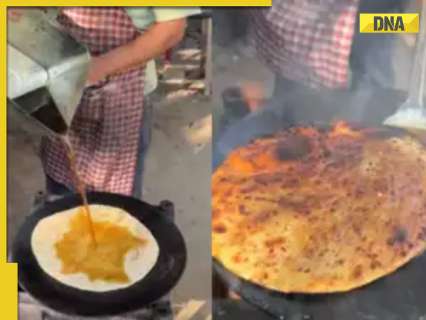
A video of a cook in a Chandigarh dhaba preparing parathas using diesel as an ingredient has gone viral.
In the realm of Indian cuisine, parathas hold an esteemed place, serving as a beloved staple for breakfast, lunch, and even dinner. With their versatile nature and delightful taste, they are a favorite among many. However, a recent video circulating on social media has stirred up a storm in the culinary world, showcasing an unorthodox method of preparing this cherished dish.
True recipe for cancer (petrol diesel wala paratha)
Where r we heading? pic.twitter.com/IIqbNarAkv
— NebulaWorld (@nebula_world) May 12, 2024
The footage, shared by user @nebula_world, unveils a startling scene from a dhaba (roadside eatery) in Chandigarh, where parathas are being cooked not in conventional ghee or butter, but in what appears to be “diesel.” Yes, you read that correctly – diesel.
In the video, a curious onlooker queries the cook, identified as Bablu, about the peculiar ingredient he is using. With a nonchalant demeanor, Bablu labels his creation as “diesel” paratha. Demonstrating the process, he expertly rolls out the dough, stuffs it with a potato mixture, and proceeds to cook it on a pan. What follows is a concerning sight as he liberally douses the paratha with copious amounts of oil, referring to it as “diesel.”
Since its upload on May 12, the video has garnered significant attention, accumulating over four lakh likes and counting, along with more than 1,100 shares and numerous comments expressing a spectrum of reactions.
Among the responses, one individual expressed apprehension, hinting at potential health hazards, “He will be buying a Ferrari soon & his customers will be selling their houses & cars soon to fund cancer treatment.”
Another raised the issue of food safety regulations, questioning, “Aren’t there any kind of Food Safety Regulations for street foods in India?”
A third voiced skepticism regarding the quality of the dish, stating, “I don’t think it’s diesel or petrol, but whatever it is, it’s definitely not fit for human consumption.”
Adding to the discourse, a fourth commenter shed light on the practice of repurposing used cooking oil, “People may not be aware, but some companies collect the oil spent from restaurants to repurpose it as lubes and fuel. Higher the tan, the higher the carbon content.”
Amidst the flurry of reactions, a fifth commenter offered a cautious suggestion, “Stop eating outside. If you can’t resist, then only go to some good quality restaurants.”






